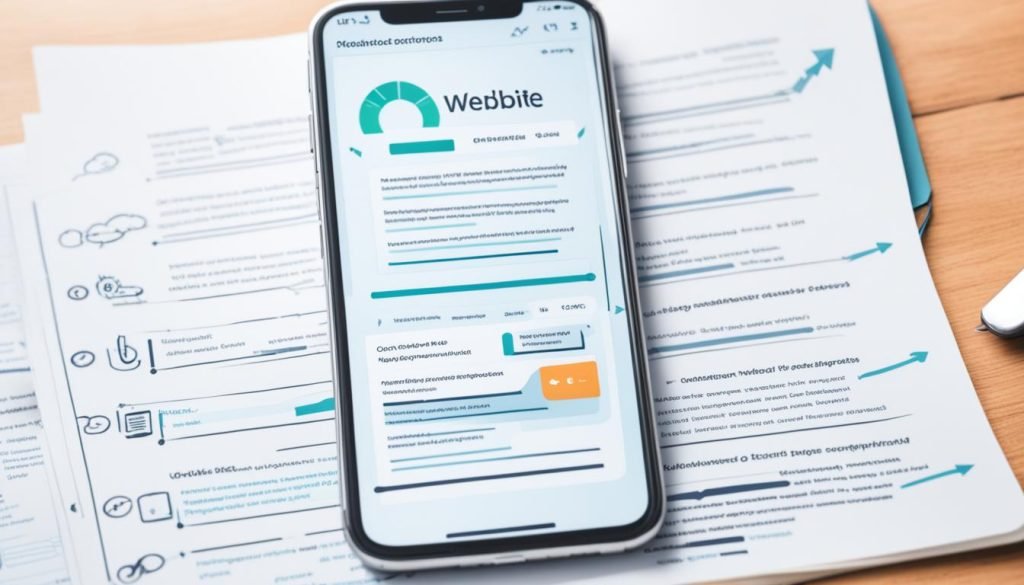Is your business website not doing well on search engines? Do you want to make it better and reach more people online? You’re in the right place! This guide will show you important ways to make your website better for search engines. If you use these tips, your website will be easier to find. This means more people will visit your site.
Key Takeaways
- Start by checking your website carefully to see what needs improvement.
- Finding and using the right keywords in your content is very important.
- Make sure your website is easy for search engines to read by adjusting titles and descriptions.
- Having great content that people enjoy is key to keeping them coming back.
- Make your website fast to load and work well on phones to please visitors and search engines.
Conduct a Comprehensive Website Audit
First, you need to check your website carefully. This means looking at how it’s built, what it says, and how it works. You’ll find out what needs to be better. This makes sure your website is up to date and works well.
Next, look at how easy it is to find things on your site. Check if the info matches what your visitors want. You’ll also see if the pages load fast, work on phones, and if the web addresses make sense.
After the audit, you’ll know what to fix to make your site better. Maybe change how to find things or add new info for your visitors. You might also improve how fast pages load for a smoother visit.
Doing this deep check helps you make your website the best it can be. You’ll fix problems that stop people from visiting your site. This means more people can find you online. It helps your business grow.
Keep an eye out for more tips. Next, we’ll talk about why finding the right words to use on your site is important.
Perform Keyword Research
Keyword research is a key step for boosting your website on search engines. Identify the best keywords for your site. Using these keywords right can pull more visitors from search engines. This could make your site more visible and bring more potential customers.
So, how do you carry out great keyword research for your business? Here’s how to begin:
- Start with a brainstorming session: Think of your business’s main topics. Consider your products or services, what your audience needs, and any special keywords.
- Utilize keyword research tools: Many tools can help you discover good keywords. Some top choices are Google Keyword Planner, SEMrush, and Moz Keyword Explorer. They offer insights into how often words are searched, how competitive they are, and other similar keywords.
- Analyze competitor keywords: Check the keywords your competitors use. This can give you keyword ideas and help spot any strategy gaps.
- Consider long-tail keywords: Don’t just go for broad keywords. Long-tail keywords are longer phrases with less competition but can bring in very interested visitors.
- Organize and prioritize your keywords: After finding your keywords, sort them. This helps you know which ones to focus on first.
It’s not just about using many keywords. They need to fit naturally in your content. Your main goal should be to offer valuable content that your audience will love. With the right keywords used well, you can make your site more visible and attract better traffic.
Next, we’ll look at how optimizing page elements can boost your site’s search engine performance.
Optimize On-Page Elements
For better on-page optimization, focus on key elements of your web pages. Optimizing titles, headings, meta descriptions, and image alt tags boosts visibility. Try these tips to improve on-page elements.
1. Titles
The title of each page is very important for SEO. Keep it short, relevant, and use your keywords. Avoid common titles. Make sure every page has its own special title that shows what’s inside. Add your keywords in the title, but don’t overdo it.
2. Headings
Headings help organize your content and show search engines its structure. Use H1 for your main title and H2 to H6 for subheadings. Add your keywords in the headings. Make sure they fit in smoothly with your content.
3. Meta Descriptions
Meta descriptions give a quick summary of your page in search results. Write catchy and detailed meta descriptions to draw people to your site. Use your keywords smartly. Each description should be special and match the page’s content.
4. Image Alt Tags
Image alt tags help with SEO and making your site accessible. Use keywords to describe your images in the alt text. This helps search engines get your images and boosts your rank in image search. Alt tags also help people who use screen readers.
Optimizing these on-page factors makes your website more search engine-friendly. Focus on making your site easy to read and use keywords wisely. Keep improving these areas to draw more organic traffic and boost your online presence.
Create High-Quality Content
To boost your business website, you need top-notch content. This draws and keeps your audience interested. Good content is more than just words; it’s about giving your readers useful and interesting information.
First, get to know your audience and what they need. Find out what topics they value. Solve their problems or answer their questions to gain their trust and show you’re reliable.
Also, how your content looks matters. Use headings, subheadings, and lists to make it easy to scan. This makes your site better for readers and search engines.
Remember, top content is not just for Google; it’s to help your readers.
Make sure your content is well-written and mistake-free. Bad writing can make readers leave. Always check your work to keep it perfect.
Optimizing Your Content for Search Engines
It’s key to write for your audience and for search engines. Use keywords to make your site more visible. This brings more visitors.
Do keyword research to find what your audience looks for. Use these keywords properly in your content. But don’t overdo it, as it can make reading hard.
Also, organize your content well. Use clear headings to tell readers what each part is about.
Last, share your great content everywhere. Post it on social media, emails, and forums. This can bring more people to your site and improve your rank on Google.
Keep making excellent content and making it search engine friendly. This way, your website will become a go-to spot in your field, bring in more visitors, and reach its fullest potential online.
img {
display: block;
margin: 0 auto;
width: 80%;
}
Improve Website Load Speed
A fast website makes visitors happy and helps your site rank better in searches. Slow websites make people leave and feel upset. Even waiting an extra second can make you lose visitors. So, making your website load faster is very important.
Leverage Image Optimization
Big image files make your site slow. To fix this, make images smaller before you upload them. Use tools to cut image size but keep the quality. Also, set image sizes and use designs that work on all devices. This will make your site faster.
Enhance Server Response Time
Your server’s speed affects how fast your pages load. If your server is slow, your pages will be too. Make your server run better and fix slow parts. You might need a better hosting plan or a faster server. Using caching can also speed things up.
Implement Caching Techniques
Caching saves data to load your site faster next time. It keeps HTML, CSS, and JavaScript ready for quick access. Browser caching and CDNs make your site even quicker. CDNs spread your content worldwide, so it’s closer to visitors. This means faster loading.
Monitor and Test Load Speed
Always check how fast your site loads to find and fix problems. Use tools like Google PageSpeed Insights and GTmetrix for tips to get better. Test on different devices and internet speeds. Keep checking and testing to always improve.
Making your website faster is key to a better online presence. Use image optimization, faster servers, caching, and keep checking speed. A quick site makes visitors happy and boosts your ranking. Keep your website speedy to succeed online.
Enhance Mobile Responsiveness
Today, it’s essential to have a mobile-friendly website. Many people use smartphones and tablets to go online. Making your business website mobile-friendly improves experiences and helps with your search engine ranking.
A mobile responsive website changes smoothly for different screens. It works well no matter what device people use. This makes visiting your website a good experience, encouraging them to stay longer.
Responsive design is a big deal. It changes your website’s layout to fit the screen being used. It uses special grids, images, and queries to look great on any device.
To make your website better on mobiles, follow these tips:
- Pick a responsive design framework or a mobile-friendly template. It makes your website ready for mobiles.
- Make your images smaller in size but keep their quality. Big images can make your site slow on mobiles.
- Your website should be easy to use with a finger. Make sure buttons and links are not too small or close together.
- Check your website on various mobile devices. Look at how things like fonts and buttons appear and work.
- Make forms easy to fill out on mobiles. Use fields that work well on mobiles and help fill out forms faster.
Having a mobile-friendly website is key for happy users and better search rankings. Google likes websites that work well on mobiles. Making your website mobile-friendly puts you ahead of others. These tips will help make sure your website is ready for mobile users and grows online.

| Benefits of Mobile Responsiveness | Challenges of Non-Mobile Responsive Websites |
|---|---|
| Improved user experience | High bounce rates |
| Increased mobile traffic and conversions | Poor visibility on mobile search results |
| Higher search engine rankings | Lack of engagement and user interaction |
| Enhanced brand reputation | Missed opportunities for mobile users |
Build High-Quality Backlinks
Backlinks make your website more seen and trusted. They come from top and relevant sites. We’ll show you how to get good backlinks.
Getting great backlinks needs work, but it’s worth it. They’re like a thumbs-up from other sites. They tell search engines your site is good. We’ll look at some smart ways to get them.
1. Guest Blogging
Write a post on another site in your field. It shows you know your stuff. You can often link back to your site. Pick sites that are well-liked and fit your audience.
2. Broken Link Building
Find broken links on sites and offer yours as a fix. It helps them and gets you a link. Use tools like Check My Links to find these links.
3. Influencer Outreach
Ask influencers to share your content. If they do, more people will see your site. Always offer them something good in return.
4. Participate in Industry Directories
Add your site to directories for your industry. Pick ones that are respected and fit your topic. They can give you good backlinks.
5. Create Compelling Content
Create content that stands out and helps people. If it’s really useful, others will link to it. Try making guides or infographics that solve problems.
Remember, getting backlinks from good sites matters more than just getting a lot of them. It takes time, but your site will end up doing better.
| Strategy | Effectiveness | Difficulty |
|---|---|---|
| Guest Blogging | High | Medium |
| Broken Link Building | Medium | High |
| Influencer Outreach | High | Medium |
| Participate in Industry Directories | Medium | Low |
| Create Compelling Content | High | Medium |
Utilize Social Media Marketing
Social media is a great way to promote your business. It helps more people see your website. By using social media marketing, you can bring more visitors to your site. This makes your online presence stronger.
Having a strong social media presence helps you meet your audience. It builds brand awareness and trust. By sharing good content and talking to your followers, you become seen as an expert. This draws in potential customers.
Choose the Right Platforms
Not all social media platforms are the same. It’s vital to pick the right ones for your business. Choose where your ideal customers spend their time. Then, talk to them on those platforms.
Create Compelling Content
For social media marketing, you need to post content that people want to share. This includes useful articles, nice images and videos, and fun stuff like polls. Good content gets you more followers and shares. This makes your website more visible.

Build Relationships and Engage
It’s important to connect with your audience. Always reply to their comments and messages quickly. Start conversations, ask questions, and value their opinions. This builds a community. It also makes your website more popular and gets you loyal customers.
Collaborate with Influencers
Working with influencers can really help your marketing. Find leaders and popular figures that your audience likes. Team up with them to share content or talk about your products. Their support makes you more visible and trusted.
Remember, you need to keep at it with social media marketing. Always check how well your social media is doing. See what content people like and what they don’t. With the right approach, social media can make your site more popular and bring more visitors.
Monitor and Analyze Website Performance
It’s vital to keep an eye on how your website performs. Doing this helps you see what needs to get better. By looking at your website’s data, you can make smart changes. These changes can bring more visitors and make your site better for them.
Many tools and numbers help you check your website. Google Analytics is a popular choice. It shows your website’s visitor numbers, who they are, what they do, and if they buy anything. By looking at this, you can see which parts of your site work well or need improvement.
How fast your website loads is also key. A slow website can make people leave. Google PageSpeed Insights is a tool that helps. It checks how fast your site loads. Then, it suggests how to make it faster. Making your site faster can make visitors happier and bring more of them.
Key Metrics to Monitor
Think about these important metrics when you check your website:
- Pageviews: This tells you how many times people have looked at a page. It helps you see which parts of your site are most popular.
- Bounce Rate: This shows if people leave after seeing just one page. A high bounce rate means you need to make your site better.
- Conversion Rate: This tells you what percent of visitors do what you want them to do on your site. It’s useful to check how well your site works for your goals.
- Organic Traffic: This is about people coming to your site because it shows up in search results. If this number goes up, it means your site is doing well in searches.
- Click-through Rate (CTR): This tells you how often people click on links or ads on your site. It helps you understand if your calls to action work well.
Data Analysis and Optimization
After collecting and looking at your website data, it’s time to improve things. Here are ways to do that:
- Identify underperforming pages: Check which pages don’t do well. Make them better to get people to stay longer.
- Optimize for relevant keywords: Find and use the right keywords. This makes more people visit your site.
- Improve website load speed: Make your site faster by using less heavy images and cleaner code. A fast site is better for visitors and search rankings.
- Enhance mobile responsiveness: Make sure your site works well on phones and tablets. This helps keep visitors on your site.
By checking and improving your website regularly, you can make it better. Use tools and data to understand your traffic and how people interact with your site. This will help you attract more visitors and reach your goals.
Stay Up-to-Date with SEO Trends
SEO keeps changing, so it’s very important to keep up. By following the newest trends, your website can do well in searches. This helps your website stay ahead.
One good way to learn about SEO is by reading top blogs and websites. They have great tips and news on changes in SEO. This means you can make your website better by using these tips.
Going to SEO events is also a good idea. You get to meet experts and learn new things from them. These events are great for picking up new strategies.
Lastly, talking with others in SEO online is very useful. You can ask questions and share what you know. It’s a great way to learn from others and keep up with SEO.
FAQ
How can I optimize my business website for search engines?
To make your website better for search engines, follow these tips. Start by checking your website to see what needs work. Use specific words that people search for in your content. Make sure titles and descriptions are clear.
Make awesome content that gives people the information they need. Speed up your website by making images smaller. Your site should work well on phones too. Get other respected websites to link back to yours.
Share your site on social media to get noticed. Keep an eye on how your website is doing. Always learn about new SEO trends and tips. Doing these things can help a lot.
Why is conducting a comprehensive website audit important?
Checking your website thoroughly is key. It shows what needs to be better. You look at how it’s built, what’s on it, and if it runs well.
This helps you find problems that stop your site from doing well. Fixing these problems makes your site better for search engines and people.
How do I perform keyword research for my business?
Find the right words your customers use to search. Tools like Google Keyword Planner help you find these words. Pick words that fit what you offer.
Put these words in your website content to draw in the right visitors.
What elements should I optimize on my website’s pages?
Make your website’s pages friendly for search engines. Work on titles, headings, and descriptions. Use the right words in these to describe your page well.
This helps more people find your website.
How does high-quality content impact my website’s performance?
Great content is very important. It draws people in and keeps them interested. This leads to more visits and more people buying from you.
Search engines love good content too, which can make your website rank higher.
What can I do to improve my website’s load speed?
To make your website faster, make images smaller without losing quality. Choose a better host or use caching to reduce load time. Cut down on scripts and plugins that slow your site.
Use caching and compression to make files smaller. A faster website offers a better experience.
Why is it important to optimize my website for mobile devices?
Many people use their phones to go online. Your site must work well on all devices. This makes sure everyone can use your site easily.
Sites that are mobile-friendly are more likely to appear higher in search results too.
How can building high-quality backlinks benefit my website?
Good backlinks from major websites make your site look reliable. They’re like votes from others saying your content is worth looking at. Search engines use these as signs that your site is authoritative.
This boosts your position in search results and brings more visitors.
How can social media marketing help improve my website’s visibility?
Social media is great for sharing your business and website. Interacting with people and advertising can bring more visitors. Social media also helps more people know about your brand.
This can bring in new customers.
What tools and metrics should I use to monitor my website’s performance?
Tools like Google Analytics and SEMrush offer insights. They show how many visit your site and how they interact. Watch things like visitor numbers, how long they stay, and conversions.
Regular checks help you see where to improve. It helps you make smart changes.
How can I stay up-to-date with SEO trends?
Keeping up with SEO trends is important. Read SEO blogs, sign up for newsletters, and join webinars. Talk with SEO experts and learn about new updates and trends.
This helps you keep your site’s optimization fresh and effective.
Looking For Affordable Web Design and Digital Marketing?
AM Web Design and Digital Marketing provides professional web design services at a price that you can afford. If you have any questions or want to know more about how we can help your business grow, contact us today on 0191 5111009.
You can check out our reviews on our Google Business Profile and see why we would be the right choice for you.




